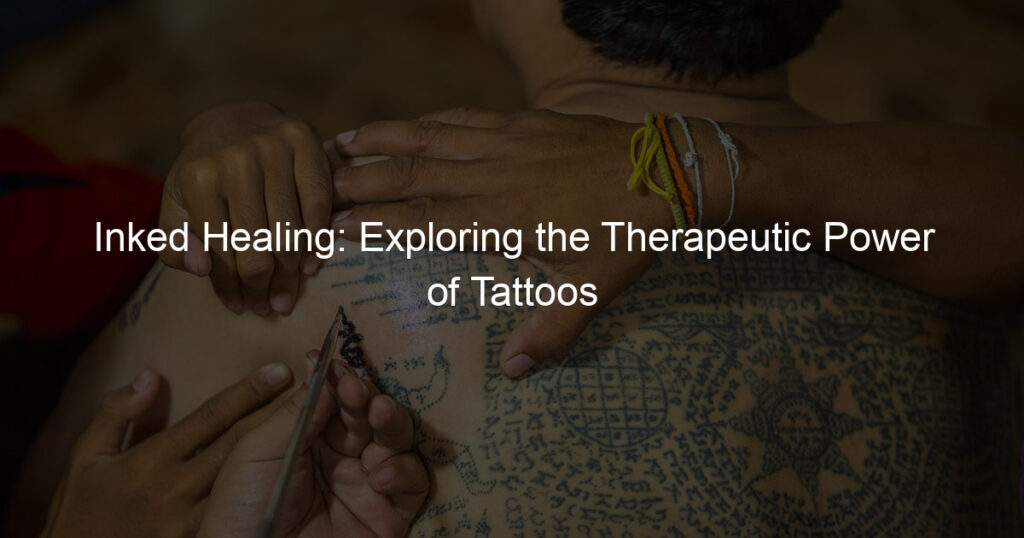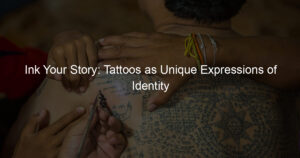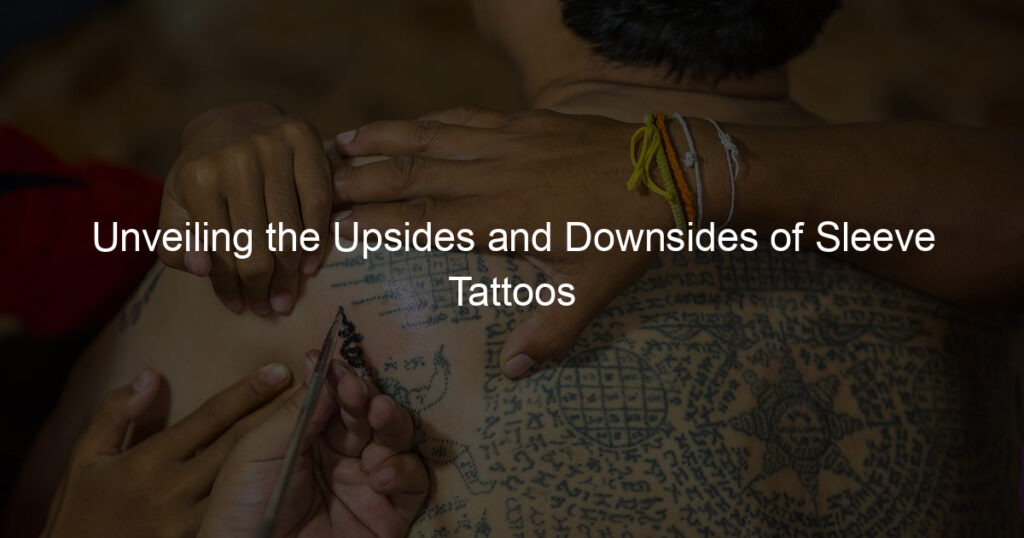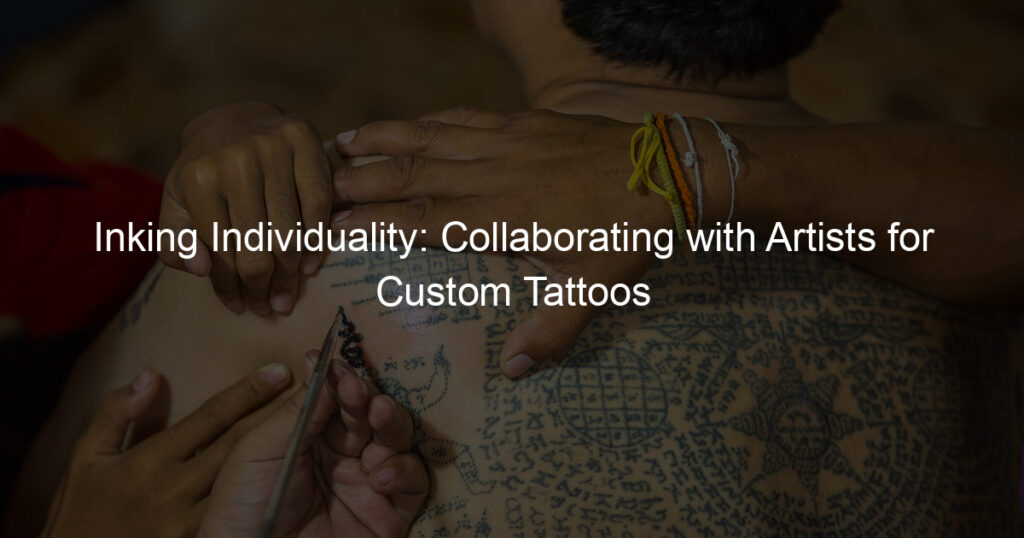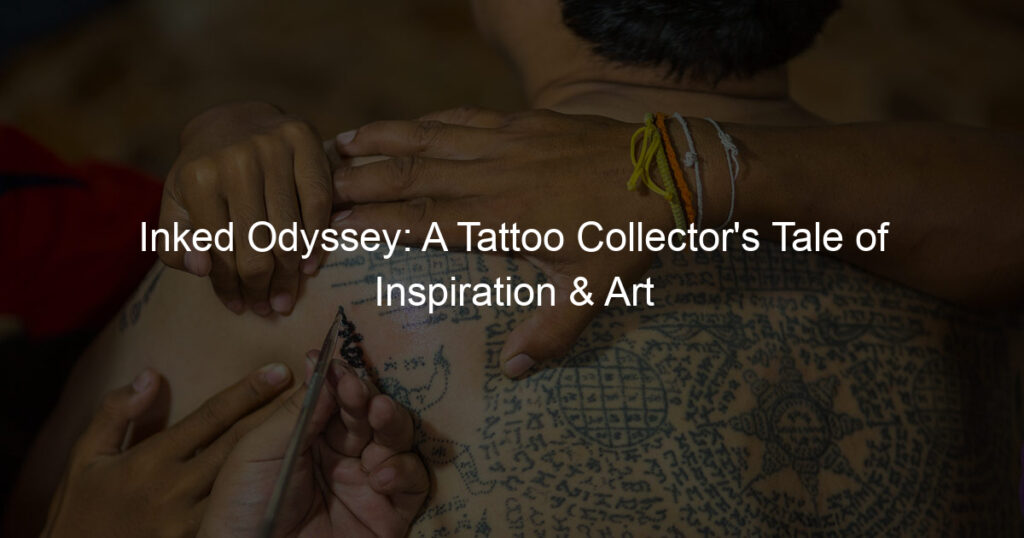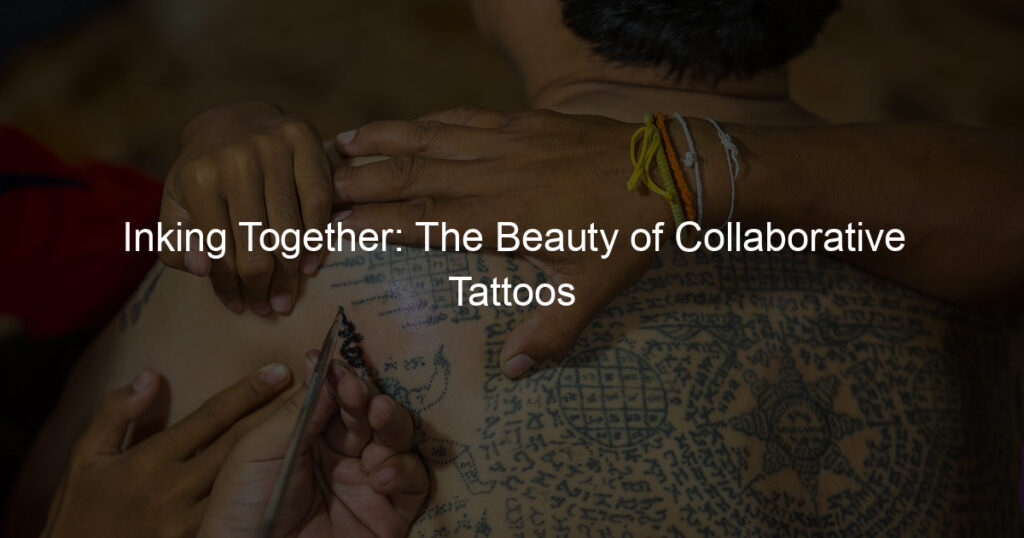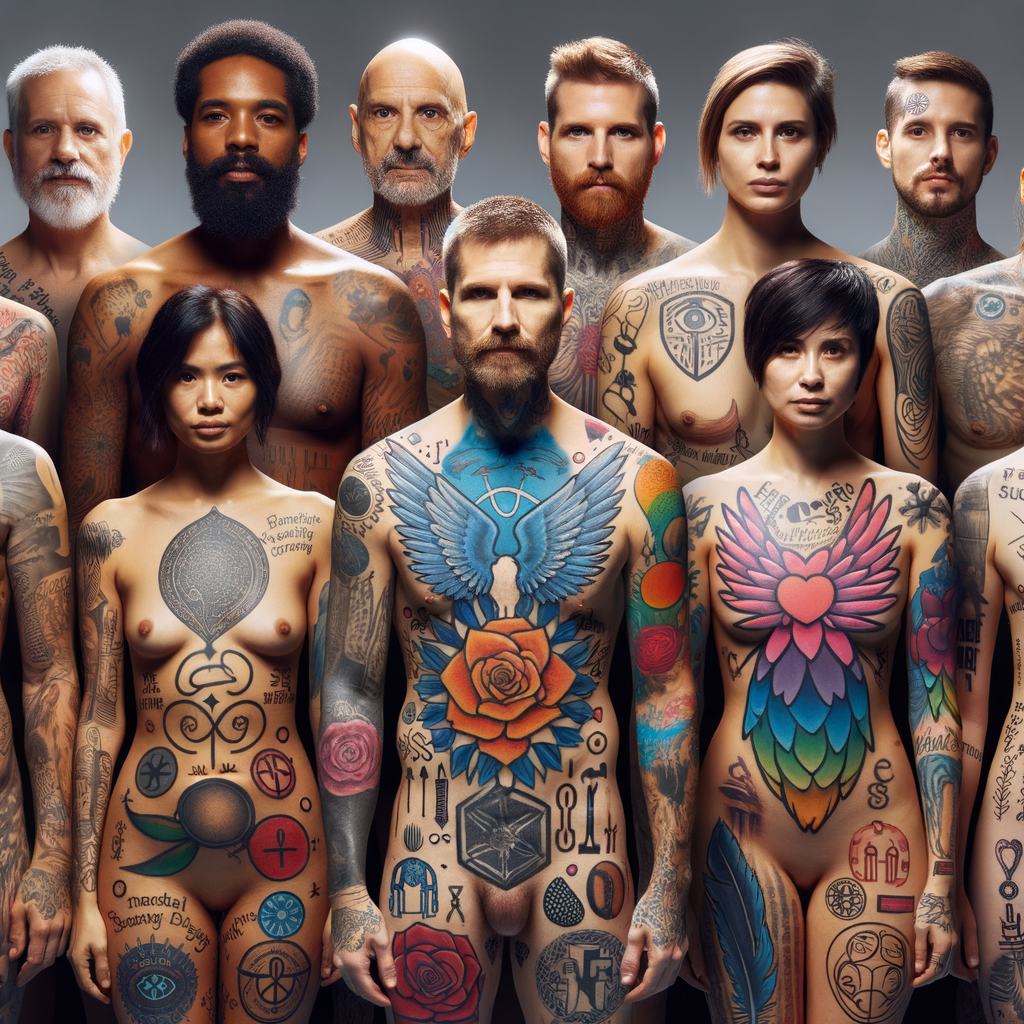
Inked Healing: Exploring the Therapeutic Power of Tattoos
Many people view tattoos as a form of self-expression or a way to commemorate a significant event or person. However, tattoos can also serve a therapeutic purpose. This article explores the healing power of tattoos, providing insights into how they can contribute to personal and emotional healing.
When we think about tattoos, we often picture intricate designs or meaningful symbols. But beyond their aesthetic appeal, tattoos can also have a therapeutic effect. They can serve as reminders of personal growth, symbols of overcoming adversity, or expressions of emotional recovery.
Tattoos can promote healing in several ways. First, they can serve as a form of self-expression, allowing individuals to communicate their feelings or experiences that may be difficult to put into words. Second, tattoos can act as a form of catharsis, providing a physical manifestation of emotional pain and helping individuals process their feelings. Finally, tattoos can serve as a constant reminder of personal growth and transformation.
| Healing Aspect | Role of Tattoos |
|---|---|
| Self-expression | Tattoos allow individuals to communicate their feelings or experiences. |
| Catharsis | Tattoos provide a physical manifestation of emotional pain, helping individuals process their feelings. |
| Reminder of personal growth | Tattoos serve as a constant reminder of personal growth and transformation. |
Case Study: Healing through Tattoos
Consider the story of Jane, a woman who got a tattoo after overcoming a severe illness. For Jane, her tattoo was not just a piece of art, but a symbol of her strength and resilience. Every time she looked at her tattoo, she was reminded of her journey and how far she had come. This helped her maintain a positive outlook and continue her healing process.
In conclusion, tattoos can serve as powerful tools for healing and personal growth. They can help individuals express their feelings, process their emotions, and remind them of their personal journeys. So, the next time you see a tattoo, remember that it might be more than just a piece of art – it could be a symbol of someone’s healing journey.
Understanding the Connection between Tattoos and Healing
Many people view tattoos as a form of self-expression or art. However, there’s a deeper connection between tattoos and healing that’s worth exploring. This connection can be seen in two main areas: the psychological impact of tattoos and their symbolism of personal growth and transformation.
- The Psychological Impact of Tattoos
Tattoos can have a significant psychological impact. For some, they serve as a form of therapy, helping them cope with emotional pain or trauma. A study conducted in 2018 revealed that 76% of respondents felt that their mental health had improved after getting a tattoo.
Getting a tattoo can be a cathartic experience, allowing individuals to express their feelings and emotions in a visible and permanent way. This can lead to a sense of relief and a feeling of control over one’s body and life.
- How Tattoos Can Symbolize Personal Growth and Transformation
Tattoos can also symbolize personal growth and transformation. They can mark significant life events or changes, serving as a reminder of the person’s journey and growth. For example, a person might get a tattoo after overcoming a difficult period in their life, such as recovering from an illness or ending a toxic relationship.
These tattoos can serve as a constant reminder of their strength and resilience, reinforcing their sense of self-worth and boosting their self-esteem. In this way, tattoos can play a crucial role in personal healing and transformation.
In conclusion, the connection between tattoos and healing is profound and multifaceted. Whether it’s through their psychological impact or their symbolism of personal growth and transformation, tattoos can play a significant role in the healing process.
Personal Healing through Tattoos
Many people find personal healing through tattoos. This form of self-expression can be a powerful tool for emotional recovery and personal growth. Let’s explore some case studies and delve into the emotional recovery process through tattoos.
-
- Case studies of individuals who have used tattoos for healing
There are numerous examples of individuals who have used tattoos as a form of healing. For instance, consider the story of Jane, a cancer survivor. After her battle with breast cancer, she decided to get a tattoo over her mastectomy scars. The tattoo, a beautiful floral design, not only covered her physical scars but also helped her heal emotionally. She stated, “My tattoo is a symbol of my strength and survival. It’s a reminder of what I’ve been through and how far I’ve come.”
Then there’s the case of John, a military veteran who suffered from PTSD. He found solace in getting a tattoo of a phoenix rising from the ashes, symbolizing his journey of overcoming his mental health struggles. “Every time I look at my tattoo, I’m reminded of my resilience and ability to rise above adversity,” he said.
-
- Exploring the emotional recovery process through tattoos
Tattoos can play a significant role in the emotional recovery process. They can serve as a form of self-expression, allowing individuals to tell their story, commemorate a loved one, or symbolize a personal transformation.
Getting a tattoo can be a therapeutic process. The act of choosing a design, placing it on your body, and going through the physical experience of getting tattooed can be a cathartic experience. It can help individuals process their emotions, confront their fears, and embrace their personal journey.
Moreover, tattoos can serve as a constant reminder of one’s strength, resilience, and ability to overcome challenges. They can instill a sense of pride and self-confidence, aiding in the emotional recovery process.
In conclusion, tattoos can be a powerful tool for personal healing. They allow individuals to express their emotions, commemorate their journeys, and find strength in their personal stories. Whether it’s a cancer survivor using a tattoo to cover her scars or a veteran using a tattoo to symbolize his resilience, tattoos can provide a meaningful pathway to healing and emotional recovery.
Tattoos for Emotional Healing
When we think of tattoos, we often imagine them as a form of body art or a way to express our individuality. However, tattoos can also serve a deeper purpose. They can be a powerful tool for emotional healing, helping us process grief and loss or serving as a form of self-expression and emotional release.
- How tattoos can help in processing grief and loss
Experiencing grief and loss can be a challenging process. It’s a time when we feel a whirlwind of emotions, and it can often be difficult to express what we’re going through. This is where tattoos can come in.
Getting a tattoo can be a therapeutic process. It allows us to physically manifest our grief, giving it a form that we can see and touch. This can help us acknowledge our loss and start the healing process. For example, some people choose to get a tattoo of a symbol or image that reminds them of their loved one. This serves as a permanent reminder of their loved one, helping them keep their memory alive.
- Tattoos as a form of self-expression and emotional release
Aside from processing grief and loss, tattoos can also be a form of self-expression and emotional release. They allow us to express our feelings and experiences in a unique and personal way.
For instance, someone who has overcome a difficult time in their life might choose to get a tattoo that represents their journey. This could be a symbol of strength, resilience, or hope. Every time they look at their tattoo, they are reminded of what they’ve been through and how far they’ve come. This can be a powerful form of emotional release, helping them let go of their past and look forward to the future.
In conclusion, tattoos can be much more than just body art. They can be a powerful tool for emotional healing, helping us process our feelings and experiences in a unique and personal way. Whether it’s through processing grief and loss or expressing our emotions, tattoos can help us on our journey towards healing and growth.
Tattoos and Mental Health
When we think about tattoos, we often think about them as a form of personal expression or a way to commemorate something important. However, tattoos can also play a significant role in mental health. They can serve as a form of therapy and aid in mental health recovery.
The Therapeutic Power of Tattoos
Tattoos can have a therapeutic effect for many people. They can serve as a form of self-care and self-expression, allowing individuals to reclaim control over their bodies and their narratives. Let’s explore this in more detail.
-
- How tattoos can serve as a form of therapy
Getting a tattoo can be a therapeutic process. It can help people cope with trauma, loss, or mental health issues. The act of choosing a design, placing it on the body, and going through the physical process of getting tattooed can be empowering. It can help individuals feel more in control and can serve as a reminder of their strength and resilience.
-
- The role of tattoos in mental health recovery
Tattoos can also play a significant role in mental health recovery. For some, they serve as a tangible reminder of the progress they’ve made in their mental health journey. They can symbolize overcoming challenges, personal growth, and the ongoing commitment to mental health. In this way, tattoos can provide a sense of hope and motivation during the recovery process.
In conclusion, tattoos can be much more than just body art. They can serve as a form of therapy and play a significant role in mental health recovery. So, the next time you see someone with a tattoo, remember that it might represent a personal journey of healing and resilience.
Healing Symbolism in Tattoos
When it comes to tattoos, each one tells a unique story. For many, tattoos are a form of self-expression, a way to commemorate significant life events, or a means of healing. In this section, we will delve into the healing symbolism in tattoos, exploring common symbols and how individuals choose them.
- Common symbols and their meanings
There are numerous symbols that people often choose for their healing tattoos. Here are a few of the most common ones:
| Symbol | Meaning |
|---|---|
| Phoenix | A mythical bird that represents rebirth and renewal. It’s a symbol of overcoming difficult times and rising from the ashes. |
| Lotus Flower | Symbolizes purity and spiritual awakening. It’s often used to represent the journey from darkness (struggle) to light (healing). |
| Semicolon | A symbol of mental health awareness and suicide prevention. It represents the decision to continue life, much like how a semicolon is used when an author could’ve ended their sentence, but chose not to. |
| Butterfly | Represents transformation and change, signifying the journey of growth and healing. |
- How individuals choose symbols for their healing tattoos
Choosing a symbol for a healing tattoo is a deeply personal process. It often involves self-reflection and understanding one’s journey of healing. Here are some factors that individuals often consider:
- Personal Significance: The symbol should hold a deep, personal meaning to the individual. It could be something that represents their struggle, their strength, or their journey.
- Visual Appeal: While the meaning is important, the visual appeal of the symbol also plays a role. After all, it’s something that they will carry on their body for the rest of their life.
- Artist’s Input: Tattoo artists are often experienced in creating meaningful, symbolic tattoos. Their input can be valuable in choosing the right symbol.
In conclusion, healing tattoos serve as a powerful symbol of resilience and recovery. They are a testament to the human spirit’s ability to overcome adversity and find healing. Whether it’s a phoenix rising from the ashes or a simple semicolon, these symbols carry profound meanings that can aid in the healing process.
Tattoos as Therapy
Many people see tattoos as a form of self-expression or a way to commemorate a significant event or person. However, tattoos can also serve a therapeutic purpose, helping individuals heal and grow. Let’s delve deeper into this fascinating aspect of tattooing.
Exploring the Therapeutic Process of Getting a Tattoo
The therapeutic process of getting a tattoo involves two main components: the role of the tattoo artist and the physical act of getting a tattoo. Both aspects contribute to the healing and transformative power of tattoos.
-
- The role of the tattoo artist in the therapeutic process
The tattoo artist plays a crucial role in the therapeutic process. They are not just an artist, but also a listener and a guide. They help the client choose the right design that symbolizes their healing journey or personal growth. The artist’s understanding and empathy can make the tattooing process a cathartic experience for the client.
-
- How the physical act of getting a tattoo can be therapeutic
The physical act of getting a tattoo can also be therapeutic. The pain involved in the process can serve as a form of release, allowing individuals to let go of emotional pain or trauma. The permanence of tattoos can also symbolize a commitment to healing and personal growth. For many, the act of getting a tattoo is a ritual that marks a significant change or milestone in their lives.
In conclusion, tattoos can serve as a powerful form of therapy, aiding in emotional healing and personal growth. The role of the tattoo artist and the physical act of getting a tattoo both contribute to this therapeutic process. So, the next time you see someone with a tattoo, remember that it might be more than just a piece of art. It could be a symbol of their healing journey.
Tattoos and Personal Growth
As we journey through life, we experience significant changes and personal growth. One unique way people choose to mark these milestones is through tattoos. Tattoos serve as a permanent reminder of the transformation we have undergone and the lessons we have learned. They can be a symbol of strength, resilience, and personal growth.
- How tattoos can mark significant life changes and personal growth
Tattoos can be a powerful tool for self-expression. They can represent a significant life change, such as overcoming a personal challenge, achieving a goal, or commemorating a loved one. For instance, someone might get a tattoo after graduating from college, symbolizing their achievement and the start of a new chapter in their life.
Moreover, tattoos can also signify personal growth. They can serve as a reminder of the obstacles we’ve overcome and the progress we’ve made. For example, a person who has battled and recovered from a mental health issue might get a tattoo to symbolize their journey and growth.
- Personal stories of transformation through tattoos
There are countless personal stories of individuals who have used tattoos as a means of marking their transformation. Let’s explore a few examples.
John, a 30-year-old man, got a tattoo of a phoenix rising from the ashes after he successfully overcame his struggle with addiction. The tattoo serves as a constant reminder of his journey and the strength he discovered within himself.
Another example is Lisa, a 25-year-old woman who got a tattoo of a semicolon on her wrist after battling depression. The semicolon represents her decision to continue her life story, despite the challenges she faced.
These stories highlight the powerful role tattoos can play in personal transformation and growth. They serve as a permanent reminder of the journey, the struggles, and the triumphs, helping individuals to remember their strength and resilience.
Tattoos for Personal Expression
One of the most profound ways people choose to express their personal identities and stories is through tattoos. Tattoos are not just body art; they are a form of self-expression that allows people to wear their hearts, souls, and stories on their skin.
Using Tattoos to Tell Your Story
Each tattoo holds a unique story, a personal narrative that is etched into the skin with indelible ink. It’s a way of telling the world who you are, what you’ve been through, and what matters most to you. Let’s delve deeper into how tattoos can be a form of self-expression and explore some examples of personal stories told through tattoos.
-
- How tattoos can be a form of self-expression
Tattoos are a powerful medium for self-expression. They can represent personal beliefs, values, or experiences that have shaped an individual’s life. For some, a tattoo might symbolize a significant life event, a loved one, or a personal philosophy. It’s a way of externalizing an internal reality, making the personal visible and tangible.
-
- Examples of personal stories told through tattoos
Many people use tattoos to narrate their personal journeys. For instance, a person might get a tattoo of a semicolon (;) to signify their struggle with mental health and their choice to continue their story rather than ending it. Another person might get a tattoo of a specific flower that reminds them of a loved one who has passed away. These tattoos serve as permanent reminders of the experiences and people that have shaped their lives.
Whether it’s a single word, a symbolic image, or a detailed scene, each tattoo carries a personal story. It’s a unique form of self-expression that allows people to share their narratives in a way that’s meaningful to them. Tattoos are more than just body art; they’re a way of telling the world your story.
Tattoos and Emotional Recovery
When we think of tattoos, we often think of them as a form of self-expression or a way to commemorate something important. However, tattoos can also play a significant role in emotional recovery. Let’s explore how.
- How Tattoos Can Aid in the Emotional Recovery Process
Tattoos can serve as a powerful tool for emotional healing. They can symbolize a person’s journey, their struggles, and their victories. By choosing a design that represents their experiences, individuals can create a visual reminder of their resilience and strength.
Moreover, the process of getting a tattoo can be therapeutic. The physical pain involved can serve as a form of release, allowing individuals to let go of emotional pain. It’s like a form of catharsis, where the pain of the tattoo needle can help to heal emotional wounds.
Finally, tattoos can provide a sense of control. For individuals who have experienced trauma or emotional turmoil, the act of choosing and getting a tattoo can be empowering. It’s a way for them to reclaim their bodies and their stories.
- Personal Stories of Emotional Recovery Through Tattoos
Many people have found solace and healing through tattoos. Here are a few examples:
One woman, after surviving a car accident, chose to get a tattoo of a phoenix rising from the ashes. The tattoo served as a reminder of her survival and her ability to rise above adversity.
Another individual, after overcoming addiction, got a tattoo of a semicolon. The semicolon represents a sentence the author could have ended, but chose not to. In this context, it symbolizes the individual’s choice to continue their life story, despite the challenges they’ve faced.
These stories highlight the transformative power of tattoos in emotional recovery. They show how tattoos can serve as a form of therapy, helping individuals process their experiences, express their emotions, and move forward with their lives.
In conclusion, tattoos can be more than just body art. They can be a powerful tool for emotional healing, providing a form of therapy and a symbol of resilience and strength. Whether it’s through the process of getting a tattoo, the symbolism of the design, or the sense of control it provides, tattoos can aid in the emotional recovery process.
Personal Transformation through Tattoos
One of the most profound ways tattoos can impact us is through personal transformation. Tattoos can serve as a physical representation of our inner growth and change, symbolizing the journey we’ve embarked on and the person we’ve become. Let’s delve into how tattoos can symbolize personal transformation and explore some inspiring case studies.
- How tattoos can symbolize personal transformation
Tattoos are more than just ink on skin. They are a form of self-expression, a way to tell our story, and a symbol of personal transformation. When we undergo significant changes in our lives, we often seek ways to represent these shifts externally. Tattoos can serve this purpose beautifully.
For instance, a person might get a tattoo after overcoming a difficult period in their life, such as a battle with illness or the end of a relationship. The tattoo serves as a reminder of their resilience and strength, a symbol of their transformation from a time of hardship to a period of growth and healing.
- Case studies of personal transformation through tattoos
Let’s look at some real-life examples of individuals who have used tattoos as a means of personal transformation.
Case Study 1: Jane’s Journey
Jane, a survivor of breast cancer, decided to get a tattoo after her recovery. She chose a design of a phoenix rising from the ashes, symbolizing her own rise from the trials of her illness. The tattoo serves as a daily reminder of her strength and resilience.
Case Study 2: Mark’s Milestone
Mark, who struggled with addiction for years, got a tattoo to commemorate one year of sobriety. His tattoo, a clock with the hands pointing to the time he attended his first recovery meeting, symbolizes his transformation and commitment to a healthier lifestyle.
These case studies illustrate the power of tattoos in symbolizing personal transformation. They serve as a constant, visible reminder of the journey, the challenges overcome, and the growth that has taken place.
In conclusion, tattoos can be a powerful tool for personal transformation. They allow us to wear our stories on our skin, serving as a testament to our strength, resilience, and personal growth. Whether it’s overcoming illness, addiction, or any other personal struggle, tattoos can symbolize the journey and the transformation that has taken place.

